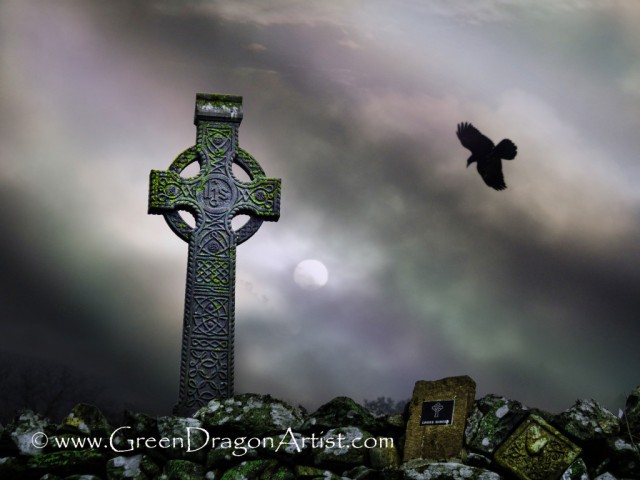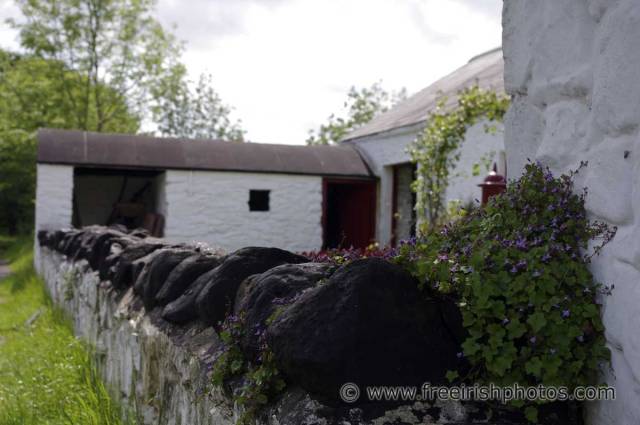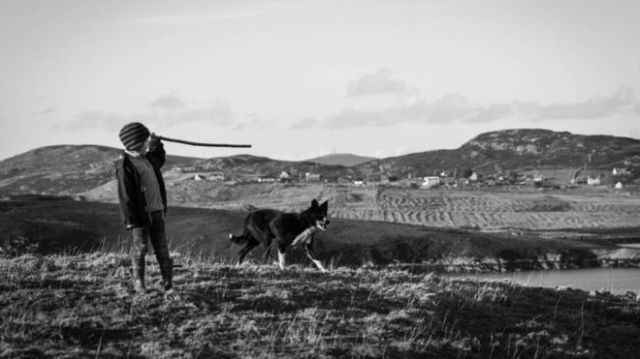Today is Saint Patrick’s Day. A guy has to be a press-ready, crowd-pleasing commodity to get his own day. But, perhaps I’m just jealous. Besides maybe Saint Columba, he’s our best known Celt. And, in honour of his Celtic lineage, I share the following.
When one thinks of the term Celt or Celtic what images spring to mind? Is it the Pictish war-paint donned by William Wallace in Braveheart as he prepares to take Scottish troops into yet another conflagration with England? Is it the Military Tattoo at Edinburgh Castle where hundreds of overly plumed peacock pipers and drummers march to and fro in a celebration of Scotland’s warring past?

Is it the drunken party at the local pub as it becomes abundantly apparent that you’ve walked into some secret society, all of whom are experts on their instruments, can drink more than any human should be capable of but with whom you feel completely welcome? Is it the great standing crosses of Ireland? Is it Larry Bird?

Whatever one may think of the Celts, one thing is sure: they were a people absolutely unique in history and centuries ahead of their time. They were an aural culture, a bardic people of story, song, poetry and mythology. As such there exists a great deal of misunderstanding regarding their exact history. In fact, they seem quite simply to have passed out of existence like a fisherman’s boat sailing into the morning mist.
One example of this relates to something many bagpipers, including myself, play on the bagpipes: Piobaireachd. Let us review that spelling, shall we?
P I O B A I R E A C H D.
It was never their intention to leave any letters for anyone else. Piobaireachd is the co-mingling of 2 Scots Gaelic words: piobaire, or piping with eachd, music. Hence, piped or piping music. Piobaireachd is the classical music of the highland bagpipe and is loosely based on the musical idea of a theme and variations. It was most likely developed by a highland clan dynasty of the MacCrimmons, ancestral pipers to the MacLeod clan on the Isle of Skye. But since there remains so little written evidence of the clan and their history, many believe them, and their development of piobaireachd, to be the fanciful fabrications of folklore.
There is plenty that we do know that can benefit us, however. The Christianity that emerged in Ireland, Cornwall, Brittany, Gaul, Isle of Man, Scotland and Wales possessed some valuable gifts. I list here but a few.
The Celtic Christianity that thrived, undivided, from roughly the fifth through the twelfth centuries, is as deeply influenced by the culture in which it was birthed as the culture that was transformed by it. It is the child of the pagan culture that preceded it. We rationalists squirm a little at this idea.
We need the Celts because of their love for the poetic imagination and artistic creativity, building on a rich tradition of bards who sang the shared stories and exploits of her kin.
We need the Celts because of their similar love for kinship, relations and the warmth of a hearth. Their love of hearth and kinship translated in spiritual terms to what they called “anam cara” or “soul friends”, those with whom they shared their deepest joys, fears, sins, hopes, dreams.
The Celts were forever at odds with Mother Rome. To my mind, this equates to a paradox or at least to a willing suspension of seeming opposites. On one hand they were as profoundly Catholic as any other sect of Medieval Christendom. They yearned to be part of the larger Christian family. That is the Celtic way. On the other, they ever marched to the beat of their own drum – a Catholicism swimming in the quasi-pagan, swarthier style of the brooding Celts. They were both in and out.
How quintessentially Celtic.
We need the Celts because they insisted on the equality of all people in the eyes of God. They celebrated an egalitarianism in everything even allowing women to perform the Mass, a heresy of the first order even in contemporary, post Vatican II Catholicism! While worshippers throughout Europe frequented any number of great cathedrals, the Celts preferred smaller, homemade altars around which they would celebrate a deeply intimate Eucharist. Especially irksome to Rome was their liturgical calendar taken more from Druidic astrology than the accepted Church calendar. Rogues to the core, what’s not to love?
We need the Celts because of the monastic communities that flowered in Britain and elsewhere that became centers of classical education and learning, even possessive of literature outlawed by the Holy Roman Empire. As such, it can be said without exaggeration that the Celts kept knowledge alive and growing throughout the Middle Ages.
We need the Celts for their great love for the natural world and for preaching a God who loved it, too. They attached particular significance to particular animals, numbers, places and natural objects. Their spirituality was mystical in character, bathed in silence and solitude but rooted squarely in the everyday. It was a rich blend of the immanence and transcendence of God.

We need the Celts because of their unquenchably adventurous spirits, well known as explorers and/or missionaries to many places. Some have suggested that they may have been some of the earliest explorers to South America where Peruvian artwork mimics Celtic knot work.
We need the Celts to broaden our sense of time. They had an understanding of time that was less chronological than kairotic. In other words, they were not especially linear in their approach to life, love, faith and relationships. They valued the cyclical dimension of time, believing that by immersing themselves in the seasons of the year and uniting their lives with the liturgical seasons of the church, they could more effectively celebrate their journey through the sacredness of time.
We need the Celts for a further distinctive, related to their concept of time; their appreciation of ordinary life. Theirs was a spirituality characterized by gratitude, and in their stories we find them worshipping God in their daily work and very ordinary chores. We, as they, can see our daily lives as a revelation of God’s love.


We need the Celts since their spirituality has great ecumenical value, transcending the differences, which have divided Christians in the East and the West since before the Reformation.
We need the Celts because, unlike we who are often more interested in what to believe than Who to follow, their Christianity was a way of life, a spirituality lived gratefully each day, one day at a time.
Finally, we need the Celts because they give us reason and opportunity to party in the presence of the God who loves us.
I’m in!

Beautifully written Rob. When I was studying Christian Spirituality, my favorite courses were on Celtic spirituality. Seeing and embracing God in the ordinary…something I have learned to embrace myself and to help others see God in the ordinary of their lives.
Thank you for sharing,
Diane
LikeLike
Diane, I’m glad it resonated with you. If I could define a spirituality that works best for me it would be the Celtic personification of Benedictine spirituality. Both are very strong on the need for hospitality – seeing Christ in friend and stranger, on continual conversion and stability, on the importance of community, on the need for anam cara or soul friends and their love for the earth.
Peace, Rob
LikeLike
So, here’s the thing. Here I am a born Celt… only, until I read your blog, I was unaware of there being so many Celtic attributes that echo in me, things I’ve fought against, some I’ve finally embraced at middle age, and a number of things that I can list as being longings that again, I’ve wrestled with. Could it be that who we are, our very identity, is as deeply embedded in us as this? I am Irish, Belfast born, North American raised, but still… I’m overwhelmed…
LikeLiked by 1 person
Well, would you look at that…6 years later and even more so! xo
LikeLike
If “longing” is anywhere to be found in your existential lexicon, the chances are good you’re a Celt at heart!
LikeLiked by 1 person
Yes, we always need those who are in but looking out, reminding the rest of us that God’s larger world, and not our navels, is the healthy focus.
LikeLike
Nice wee article Rob.
The Celts either bring heaven to earth or hell on earth.
Thankfully the Celtic monks brought the former.
I write as a lapsed Northern Irish Presbyterian and present Yeshua follower!
🙂 Dylan
LikeLike
Thank you, Dylan. Although I live and work among Presbyterians and have a Scots-Canadian background, I am much more (c)atholic-Celtic-contemplative-mystic by nature and learn from others such as yourself how to live this well. Peace…R
LikeLiked by 1 person
Can I chime in and confess a similat ilk here? Though I despise “labelling”people groups, I resonate deeply with your honest descriptor Rob. It keeps what’s important in focus, methinks.
LikeLiked by 1 person
Robert, This is one of those watershed articles that will haunt you with blessings for the rest of your life!
LikeLike
Ha! This is actually reworked from a transcript of a sermon I preached at one of our annual Celtic Praise events. Yeah, this one’s been popular to be sure. Thanks, Bob.
LikeLike
Reblogged this on innerwoven and commented:
Happy Saint Patrick’s Day, or whatever the appropriate greeting might be in such an auspicious occasion!
LikeLike
To have the gift of this heritage, and then in your beautiful writing a sensed permission to further unveil exactly who I already am…priceless. Thank you, from a Belfast born pilgrim.
LikeLiked by 1 person
Oh, Rob. You’ve done it again. I wept as I read this aloud to Bob. Though I’m almost a purebred Sassenach, everything Celtic goes straight to my soul. The earthy dailyness of the prayers, the mystical clench of the spirit at the music. Wish I had a hearthstone where I could kneel and smoor the fire, breaking the peats in three sections with the blessings, “In the name of the God of Life”, “In the name of the God of Peace”, “In the name of the God of Grace.” Such blessings I leave with you, my dear friend and anam cara.
LikeLiked by 1 person
Blessings and peace to you in abundance, dear soul.
LikeLike
I really enjoyed reading this musings of the worthy ways of the Celt/Gael; thank you for these ever-timely ancestral-wisdom reminders. I plan on sharing this with my own blog-circle (ping-back coming soon). Thank you again, Robert. Blessings, Jamie
LikeLiked by 1 person
Pingback: BlogShare: Why the World Needs the Gifts of Celt-Gael Wisdom – Sophia's Children